七年级英语听力强化训练
中考英语听力强化训练题及答案
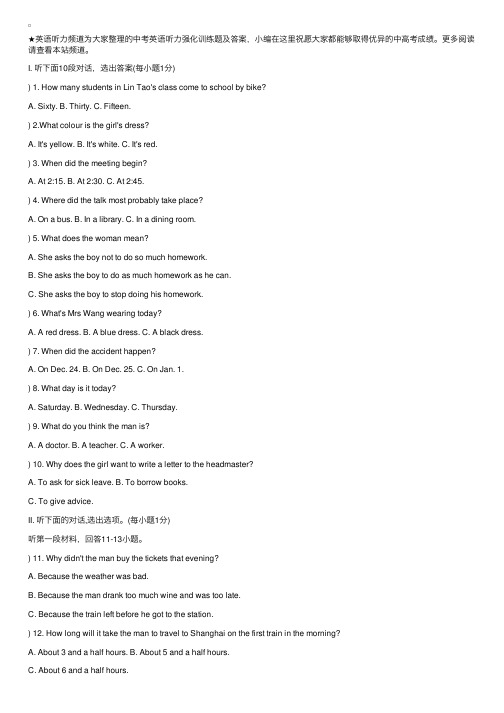
★英语听⼒频道为⼤家整理的中考英语听⼒强化训练题及答案,⼩编在这⾥祝愿⼤家都能够取得优异的中⾼考成绩。
更多阅读请查看本站频道。
I. 听下⾯10段对话,选出答案(每⼩题1分)) 1. How many students in Lin Tao's class come to school by bike?A. Sixty.B. Thirty.C. Fifteen.) 2.What colour is the girl's dress?A. It's yellow.B. It's white.C. It's red.) 3. When did the meeting begin?A. At 2:15.B. At 2:30.C. At 2:45.) 4. Where did the talk most probably take place?A. On a bus.B. In a library.C. In a dining room.) 5. What does the woman mean?A. She asks the boy not to do so much homework.B. She asks the boy to do as much homework as he can.C. She asks the boy to stop doing his homework.) 6. What's Mrs Wang wearing today?A. A red dress.B. A blue dress.C. A black dress.) 7. When did the accident happen?A. On Dec. 24.B. On Dec. 25.C. On Jan. 1.) 8. What day is it today?A. Saturday.B. Wednesday.C. Thursday.) 9. What do you think the man is?A. A doctor.B. A teacher.C. A worker.) 10. Why does the girl want to write a letter to the headmaster?A. To ask for sick leave.B. To borrow books.C. To give advice.II. 听下⾯的对话,选出选项。
强化英语听力能力的听力训练计划三篇

强化英语听力能力的听力训练计划三篇《篇一》英语听力是英语学习的重要部分,但也是许多学习者面临的难题。
为了提高英语听力能力,需要有系统、有计划的训练。
本计划旨在为学习者一个全面的听力训练方案,帮助其在短时间内提高英语听力水平。
1.分析学习者的英语听力水平,确定训练目标和阶段性成果。
2.设计多样化的听力练习材料,包括新闻、对话、讲座、电影等。
3.制定个性化的听力训练计划,合理分配每天的学习时间。
4.指导学习者运用有效的听力技巧,提高听力理解能力。
5.定期检查学习进度,调整训练计划,确保学习效果。
6.第一阶段(1-2周):了解学习者的英语听力水平,确定训练目标。
7.第二阶段(3-4周):设计听力练习材料,进行基础听力训练。
8.第三阶段(5-6周):加强听力技巧训练,提高听力理解能力。
9.第四阶段(7-8周):巩固所学,进行听力模拟测试,评估成果。
工作的设想:1.通过系统、有计划的听力训练,提高学习者的英语听力水平。
2.培养学习者运用听力技巧,提高听力理解能力。
3.激发学习者学习英语的兴趣,增强其自信心。
4.每天安排1-2小时的听力训练时间,确保学习者有足够的时间进行练习。
5.每个阶段后,进行一次听力测试,评估学习进度。
6.定期与学习者进行沟通,了解其学习需求和困难,调整训练计划。
7.制定个性化的听力训练计划,充分考虑学习者的英语水平、学习时间和需求。
8.选择多样化的听力材料,提高学习者的听力兴趣。
9.注重听力技巧的培养,帮助学习者快速提高听力理解能力。
10.每周安排一次听力课程,针对学习者的薄弱环节进行针对性训练。
11.每天布置一定数量的听力练习,要求学习者按时完成并提交。
12.定期组织听力比赛或活动,激发学习者的学习积极性。
13.学习者:按照训练计划,每天坚持进行听力训练,积极参与听力活动和测试。
14.教师:负责制定训练计划、指导学习者、检查学习进度,必要的帮助和支持。
本听力训练计划旨在帮助学习者在短时间内提高英语听力水平。
强化初中英语听力训练 提高初中英语实用性

学法指导强化初中英语听力训练提高初中英语实用性■胡东升摘要:在当今新形势的教育下,要重视初中英语听力训练,不断提高英语听力训练所占的教学比例,分析当前初中生在英语听力方面存在的问题,并结合教育实际,及时调整教育教学方法和方向,切实提高初中生英语听力水平,提高初中英语的实用性。
关键词:初中英语;听力;训练;实用性英语的教学具有听、说、读、写四个基本目标,而听的能力摆在了教学目标的首位。
随着全球化的进展和改革开放的不断深入,在英语教学过程中,越来越要求英语能够听得懂,说得出。
而在英语学习中,听力包括听和理解,听力理解的过程是人们运用各种知识和技能的过程,因此要提高初中生对英语基础知识的掌握,以提高初中生英语听力的反应速度和理解能力。
而在英语教育教学中,首先要明白学生英语听力训练方面存在的问题,才能够对症下药,解决问题。
一、初中英语听力训练中存在的问题1.词汇量缺乏:初中学生由于在小学阶段英语学习有限,导致升入初中以后词汇量不足,在英语听力过程中出现听不懂的现象,无法理解句子的含义。
2.没有英语听说的语境:在英语教学中还存在中国式英语教学和哑巴英语教学的现象,老师在课堂上通篇用汉语进行英语的讲解或者只是注重语法的教学而忽视对发音的练习。
学生没有形成英语听力的习惯,缺乏英语听力的语境。
3.文化差异的影响:由于中西方文化存在的差异,在语言的表达上也存在明显的不同,而在日常的英语教学中老师忽视对文化背景的介绍,就会在听力过程中出现不理解文化概念,从而无法理解所听到的语句。
二、强化初中英语听力训练的策略1.在教学中注重词汇量和语音知识的讲授在英语教学过程中教师要想方设法增加学生的词汇量,词汇是语言学习的基础。
英语作为一门语言,也是以词汇为基础构成的。
同时要加强对语音知识的讲解,注重对学生不良发音习惯的纠正,只有学生的发音是标准的,在听力过程中才能够听到正确的信息。
2.创设英语听力氛围教师在平时讲课时要规范地使用英语进行授课,不断提高自己的英语教学水平和业务能力,为学生创造一个良好的英语听力氛围,使学生形成良好的英语听力训练习惯。
初中英语听力听填信息解题对策及建议

初中英语听力听填信息解题对策及建议摘要:英语听力是中考必修测试题,根据课程改革的根本要求,初中英语教育需着眼于学生听、说、读、写综合能力发展,而听力和口语则是平时最容易忽视的部分,导致学生在考试时,要么听不清、听不准,要么不知如何正确填写试卷信息,影响整体考试成绩。
对此,本文结合中考英语听力的考察侧重点,对听填信息解题对策给出几点教学建议,加强对学生听力技巧与答题能力的综合训练。
关键词:初中英语;听力训练;听填信息;解题能力初中英语听力测验也就是从英语“听”的角度出发,考核学生对英语语言的接受理解程度以及信息收集能力。
在中考英语试卷中,第一部分就是听力题,学生听力答题情况可能对其后续考试产生直接影响,因此掌握听力听填信息解题对策非常重要。
在日常教学训练时,教师应重视听力训练部分,并结合学生实际情况传授解题技巧,由浅入深强化听力训练效果,提升学生应试能力。
1、初中英语听力训练思路1.1 夯实英语基础英语是一门讲究听、说、读、写综合发展的学科,强化“听力”训练,必然要先夯实基础,这样才能确保听力过程中听得清、听得懂,快速听填信息,提高解题准确性。
在日常教学活动中,有意识地督促学生积累词汇量,掌握字母、单词、句式的准确发音,形成良好“听感”和“语感”。
比如从七年级开始,强化训练26个英文字母以及48个音素的准确发音,由易到难,全面掌握长短元音、相近音、清辅音、爆破音等,如单词“foot”、“book”、“good”都有字母“oo”,发短音[u];在句子发音中,又会涉及缩读、略读、弱读、同化等规则,如“Nice to meet you”为同化发音,准确辨别,才能听懂语音语义,这是准确答题的前提条件。
1.2 强化听力训练从近年来中考试卷的出题内容来看,大多侧重于生活或者社会焦点,以餐厅、图书馆、火车站等生活背景为主,或者探讨购物、旅游、交通等话题。
那么在平时教学设计时,教师应挖掘教材中的素材,归纳总结以往听力试题中高频出现的话题、词汇、句式或语法,有针对性地开展听力训练,积累解题经验。
初一听力模拟试题及解析

初一听力模拟试题及解析第一部分:听力题(共20小题)每题仅读一遍。
计15分1. What day is it today?2. Where does the conversation most probably take place?3. What does the woman want to buy?4. How much does the sweater cost?5. What is the woman going to do next?6. What does the woman want to do?7. How much are the socks?8. What is the woman doing?9. What time do the children finish school?10. What is the woman going to do?11. What are they talking about?12. What does the man look like?13. What is the man talking about?14. How does the woman feel?15. What does the man think of the party?16. What does the man mean?17. What does the woman want to drink?18. When will the speakers probably meet next time?19. What is Peter going to do?20. What does the man need to do?第二部分:笔试题(共80分)听力材料Text 1M: Today is Wednesday, isn't it?W: No, it's Tuesday today.Text 2W: Excuse me, where is the post office?M: Turn left at the first corner. It's on your right, beside the supermarket.Text 3W: I want to buy a new dress, but I don't have much money.M: There is a big sale at the department store. You can get a dress at a good price.Text 4W: How much is the blue sweater?M: It's 100 dollars.Text 5W: Could you help me find my glasses?M: Sure, let me have a look under the bed.Text 6M: The summer vacation is coming. What do you plan to do? W: I want to go to the beach and have a picnic with my friends. Text 7W: How much are the socks, please?M: They are 10 yuan per pair.Text 8M: What are you doing, Lucy?W: I am brushing my teeth. What about you?Text 9W: What time do your children finish school?M: They finish at 3:30 p.m.Text 10W: I have a headache. I think I will go see the doctor.M: You should get some rest first. Maybe you will feel better. Text 11W: Have you heard about the new basketball club?M: Yes, they will have tryouts next week.Text 12W: Our new classmate is tall and has short black hair.M: I think I know who you are talking about. He is John, right? Text 13M: My camera is broken. Do you know how to fix it?W: You should take it to the camera store. They can help you. Text 14W: I'm so excited to meet my friends tonight!M: You always have a good time with them.Text 15M: I don't really like the party last night. It was too crowded. W: Really? I thought it was great. I met many interesting people. Text 16W: I can't find my wallet. Have you seen it?M: Did you check your bag? Maybe you put it in there.Text 17M: Would you like some coffee?W: No, thanks. I prefer tea.Text 18W: I had a great time with you today.M: Yes, we should meet up again soon.Text 19M: What are your plans for the weekend?W: I am going to visit my grandparents in the countryside. Text 20W: Can you help me move this heavy table?M: I'm sorry, I hurt my back yesterday. I can't help you.试题解析:第一部分:听力题1. B2. A3. C4. A5. C6. A7. B8. C9. C 10. A11. C 12. A 13. B 14. B 15. C16. B 17. A 18. C 19. B 20. A第二部分:笔试题21. C 22. A 23. B 24. A 25. B26. C 27. B 28. A 29. C 30. B31. B 32. C 33. B 34. A 35. B36. C 37. C 38. A 39. B 40. A41. A 42. A 43. B 44. B 45. C46. A 47. C 48. B 49. A 50. C51. C 52. B 53. A 54. C 55. A56. B 57. C 58. B 59. A 60. A61. B 62. C 63. B 64. C 65. A66. B 67. A 68. C 69. A 70. C71. B 72. B 73. C 74. C 75. B76. C 77. B 78. A 79. B 80. C题目解析:本套试题分为两个部分:听力题和笔试题。
初中英语教学中如何加强学生的听力训练
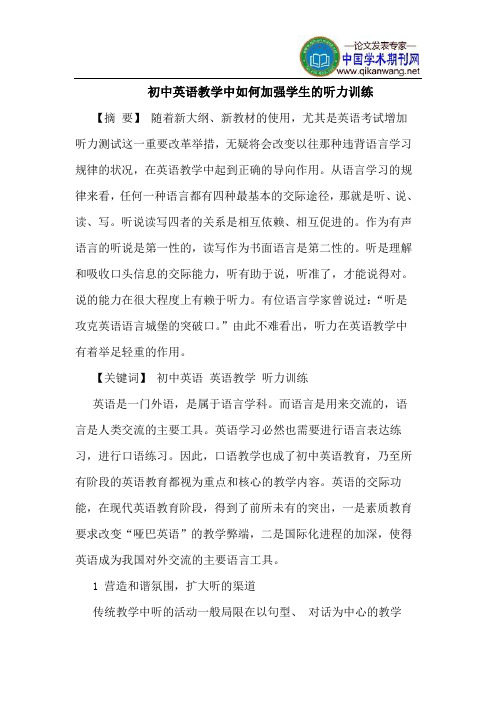
初中英语教学中如何加强学生的听力训练【摘要】随着新大纲、新教材的使用,尤其是英语考试增加听力测试这一重要改革举措,无疑将会改变以往那种违背语言学习规律的状况,在英语教学中起到正确的导向作用。
从语言学习的规律来看,任何一种语言都有四种最基本的交际途径,那就是听、说、读、写。
听说读写四者的关系是相互依赖、相互促进的。
作为有声语言的听说是第一性的,读写作为书面语言是第二性的。
听是理解和吸收口头信息的交际能力,听有助于说,听准了,才能说得对。
说的能力在很大程度上有赖于听力。
有位语言学家曾说过:“听是攻克英语语言城堡的突破口。
”由此不难看出,听力在英语教学中有着举足轻重的作用。
【关键词】初中英语英语教学听力训练英语是一门外语,是属于语言学科。
而语言是用来交流的,语言是人类交流的主要工具。
英语学习必然也需要进行语言表达练习,进行口语练习。
因此,口语教学也成了初中英语教育,乃至所有阶段的英语教育都视为重点和核心的教学内容。
英语的交际功能,在现代英语教育阶段,得到了前所未有的突出,一是素质教育要求改变“哑巴英语”的教学弊端,二是国际化进程的加深,使得英语成为我国对外交流的主要语言工具。
1 营造和谐氛围,扩大听的渠道传统教学中听的活动一般局限在以句型、对话为中心的教学中,着重于语言形式的听辨和记忆,信息的输入量明显不足。
而平时做的听力技巧专项训练,多是测试性题目,目的性太强,做得多了,很容易引起学生的疲倦、排斥、甚至反感,从而失去对听力的兴趣。
现代语言教学理论认为,充分的、以理解内容为目的的语言输入是形成交际性听力,乃至决定整个语言学习成功的关键。
在课堂上,教师应该坚持尽可能地用英语教学,包括问候、课堂用语、评价、布置作业,并且也要求学生努力在课堂上尽可能说英语,不要担心学生做不好,事实证明,用不了多长时间,学生完全能听懂你的指令、要求,甚至还能学会你的一些用语。
给学生一个良好的语言环境,让他感到身处异域,而自己能应付自如地与人交流,从而获得一定的成就感。
七年级英语期中备考计划
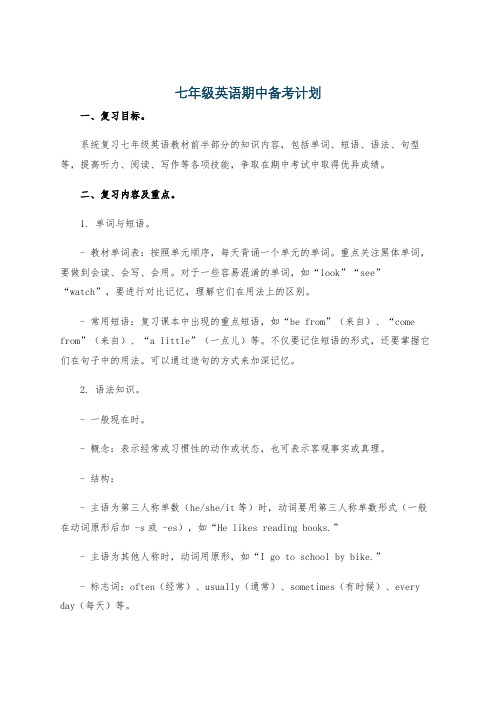
七年级英语期中备考计划一、复习目标。
系统复习七年级英语教材前半部分的知识内容,包括单词、短语、语法、句型等,提高听力、阅读、写作等各项技能,争取在期中考试中取得优异成绩。
二、复习内容及重点。
1. 单词与短语。
- 教材单词表:按照单元顺序,每天背诵一个单元的单词。
重点关注黑体单词,要做到会读、会写、会用。
对于一些容易混淆的单词,如“look”“see”“watch”,要进行对比记忆,理解它们在用法上的区别。
- 常用短语:复习课本中出现的重点短语,如“be from”(来自)、“come from”(来自)、“a little”(一点儿)等。
不仅要记住短语的形式,还要掌握它们在句子中的用法。
可以通过造句的方式来加深记忆。
2. 语法知识。
- 一般现在时。
- 概念:表示经常或习惯性的动作或状态,也可表示客观事实或真理。
- 结构:- 主语为第三人称单数(he/she/it等)时,动词要用第三人称单数形式(一般在动词原形后加 -s或 -es),如“He likes reading books.”- 主语为其他人称时,动词用原形,如“I go to school by bike.”- 标志词:often(经常)、usually(通常)、sometimes(有时候)、every day(每天)等。
- 名词的单复数。
- 规则变化:- 一般在名词后加 -s,如“book - books”。
- 以s、x、sh、ch结尾的名词,加 -es,如“box - boxes”。
- 以辅音字母 + y结尾的名词,把y变为i,再加 -es,如“city - cities”。
- 以o结尾的名词,有生命的加 -es(如“tomato - tomatoes”),无生命的加-s(如“photo - photos”)。
- 不规则变化:如“man - men”、“woman - women”、“child - children”等,需要特殊记忆。
在英语教学中如何加强学生的听力训练

在英语教学中如何加强学生的听力训练摘要:在初中英语教学中,对英语信息的获取和吸收的重要手段就是听。
教师在教授英语时的核心就是“听、说”,在中考中,听力占有一定的分值,要增强学生的听力能力,首先要培养学生听力训练的兴趣,在训练过程中也要采取系统和科学的方法。
作者结合在教学实践中的经验,分析初中英语学生听力训练的方法。
关键词:初中英语教学听力训练教学实践在当今世界上,国际交流日益密切,英语作为一种使用范围最广的语言,受到了越来越多的重视。
对英语信息的获取和吸收的重要手段就是听,这也是英语能力竞赛和中考中在测试听力时的要求。
听力测试的是学生的领悟能力,它也是一种结合听音、辨音和会意三者的综合性能力,这种能力的形成需要经过连续的强化培训。
笔者在教英语的时候,围绕听、说两个部分,激发学生的兴趣,并对其采取科学、系统的方法,对学生的听力进行训练。
一、培养学生英语听力训练的兴趣1.指导学生正确认识语言学生在英语学习初期时兴致较高,但是一段时间后,一些同学会对其感到疲惫,所以教师应当帮助学生正确地认识语言,为学生营造成轻松和谐的学习氛围,将他们的求知欲激发出来。
当训练学生的听力时,应当先进行语言环境的创造,这是很重要的。
2.增强学生的意志力人们控制情绪都是通过情商实现的,这不是智力因素。
对于一些具有较高的意志力的人来说,他们能够对自身的学习进行正确认识,在与环境的调节和控制中也能及时反应,能够自我激励,及时调整在困境中的心态,转挫折为动力。
在教学过程中,教师要尽可能地提高学生的意志力。
3.教师适当给学生减压教师应当增加学生的听力时间,不要经常性地给学生过多紧张的听力测试。
一个宽松、良好的环境对于放松学生的情绪是很有效的,这有助于增强学生完成听力任务的自信心。
二、英语训练时应注意的事项1.营造安静的氛围教师在训练学生的听力过程中,应当坚持使用英语对话,让学生适应于营造出的氛围,同时老师应当帮助学生注意口语发音,始终保持课堂的安静,使得学生在把握内容和辨别语音、语调时集中注意力,听思结合,不要过急地回答问题。
七年级英语听力强化训练

强化训练(二)满分:25分Ⅰ.请听单词,选择他们所属的类别。
朗读两遍。
(5分)A.colourB. foodC. clothesD. countryE. animal1. 2. 3. 4. 5. Ⅱ.请听句子,选择最佳的应答语。
朗读两遍(5分)A.It’s a sweater.C. There it is.B. I feel very hot.E. Sure. Here you are.D. My elbow hurts.6. 7. 8. 9. 10. Ⅲ. 请听对话及问题,选择相应的图片。
朗读两遍。
(5分)Ⅳ.请听短文,选择正确答案。
朗读两遍。
(10分)( )16. What does Peter do?C. A reporter.A. A doctor.B. A waiter.( )17. What does Peter look like?A.He is tall with blond hair.B.He is of medium build and has blond hair.C.He is of medium height and has brown hair.( )18. What does Peter think of the Great Wall?A.He doesn’t mind it.B.He doesn’t like it.C.He loves it .( )19. What kind of food does Peter like?A.Peking Duck.B. Noodles.C. Dumplings. ( )20. What does Peter think of lions?A.Big and lazy.B.Big and dirty.C.Dirty and lazy.强化训练(三)满分:25分 Ⅰ.听句子,选出与其意思相符的图片。
朗读两遍。
(5分)Ⅱ.听对话,选择正确答案。
中考英语听力强化训练1000题

中考英语听力强化训练1000题全文共6篇示例,供读者参考篇11000 English Listening Practice Questions for Middle School Entrance ExamsHey there, awesome English learners! Are you getting ready to take the big middle school entrance exam? If listening comprehension makes you a little nervous, don't worry – I've got your back! Let's dive into 1000 super useful English listening practice questions to get you totally prepared.We'll start off nice and easy. Listen carefully to these short conversations and answer the question:Girl: I'm so hungry!Boy: Me too. Should we get pizza or burgers for lunch?Girl: Mmm, pizza sounds amazing. Let's do that!What did the boy and girl decide to eat?Pretty simple, right? You got this! Okay, let's keep going with some more listening questions just like that. Don't be afraid to rewind and listen again if you need to....(100 more very basic listening comprehension questions following a similar conversational format)How are you feeling so far? Getting the hang of it? Amazing! You're already 10% of the way through these practice questions. Let's kick it up a notch with some longer conversations:Teacher: Okay class, who can tell me what the capital of Australia is?Student 1: I think it's Sydney.Student 2: No, that's not right. I'm pretty sure it's Melbourne.Student 3: You're both wrong! The capital is Canberra.Teacher: That's correct, well done!What city is the capital of Australia?(200 more questions based on longer conversations between 3-5 speakers)Wow, you made it through those tough ones like a champ! I bet your listening skills are getting stronger by the minute. Before we move on, let me just say - you're doing awesome! Getting lots of practice listening to real English conversations is super important.Alright, next up we've got some listening passages. These are a little longer, but you can totally handle it. Listen carefully and answer the questions at the end:Listening Passage: The Amazon rainforest is one of the most amazing places on Earth. Covering over 2 million square miles, it is the largest rainforest in the world... (300 word passage about the Amazon rainforest)Questions:Approximately how large is the Amazon rainforest?What percentage of the world's species live in the rainforest?Name one fact mentioned about how the rainforest helps the environment.(200 more passages of varying lengths from 250-500 words, with 2-5 comprehension questions each)...You're an absolute listening master now! I'm so proud of how far you've come. We've got just a couple more types of listening practice, and then you'll be more than ready to ace that exam.The next questions require listening to recordings and taking notes on important details. This is a crucial skill! Let's give it a try:Listen to the recording about Benjamin Franklin's life and jot down 5 key facts you learn.(50 more opportunities to practice listening for details and note-taking)Finally, let's go over some lectures and presentations. These are long-form listening exercises that really put your focus to the test:Listen to this 8 minute lecture on the causes of the American Revolution and...(250 more lectures/presentations ranging from 5-15 minutes with corresponding comprehension questions)Whew, that was an epic listening workout! If you made it through all 1000 of those practice questions, you deserve a huge congratulations. Your English listening skills must be incredibly strong now.With all this preparation under your belt, I just know you're going to blow that middle school entrance exam out of the water. Stay confident, keep practicing, and you'll do amazing! Let me know if you need any other study tips along the way. You're going to rock this!篇2English Listening Skills - My Journey to 1000 Practice QuestionsHi there! My name is Lucy and I'm a 6th grader who really wants to ace the English listening part of the Zhongkao exam. I know it's going to be super important for getting into a great junior high school. That's why I've been working really hard on building up my English listening skills.At first, it felt kind of overwhelming. Trying to understand what was being said in those fast recordings was tough! The vocabulary was unfamiliar and the speech seemed to blur together. But my English teacher Mr. Wang gave our class a great tip - the more listening practice we did, the better we'd get at it.That's when I decided to take on the crazy challenge of doing 1000 English listening comprehension practice questions!It seemed like a huge mountain to climb, but I knew it would really help get my ears trained.I started slowly, maybe doing 10 questions a day after school. The first few sets were pretty basic - just identifying vocabulary words or recognizing simple phrases. But I still got some wrong because my listening wasn't quite tuned in yet.Gradually, the practice questions got harder. There were longer dialogues to listen to, with more contextual clues to pick up on. Or recordings about specific topics like science or history facts. Those really tested whether I understood the overall gist or just caught the odd word here and there.Some days were definitely harder than others. Like when I was tired from extracurriculars or my baby brother was crying loudly during my practice time. But I tried to stick with it as much as I could. Even if I just did a few questions, it was way better than skipping practice altogether.My parents were so supportive through this process! They helped me find useful listening websites and podcasts for kids. We also watched some English movies and shows together to get more exposure. Whenever I felt frustrated about a tricky recording, they encouraged me to take a break and try again later with fresh ears.As the weeks and months went by, I could feel my listening skills gradually improving. Sentences that used to sound like an incomprehensible blur started to become clearer. I picked up on context clues and intonation better. My scores on the practice tests were getting higher and higher!Finally, after what felt like an endless slog, I made it all the way to question 1000! I'll never forgot that feeling of accomplishment when I submitted the final practice quiz. Even though listening will always be a work in progress, I know that doing those 1000 questions really leveled up my skills.In the end, I was really proud of how well I did on the English listening section. All that hard work of tackling 1000 practice questions had paid off! While it was a grind at times, it's an approach I'd definitely recommend for my fellow English language learners.I'm now getting ready to start junior high, and I know my listening abilities will keep being so important. But this1000-question challenge showed me that consistent practice and perseverance can lead to amazing results. Just don't lose hope during the tough stretches!So keep listening, keeping practicing, and stay motivated. Those listening skills will become stronger day by day. You've got this!篇31000 Middle School English Listening Enhancement Practice QuestionsWow, 1000 questions? That's a lot! But hey, practice makes perfect, right? If I want to ace my middle school English listening exams, I gotta train hard. Let me tell you all about this awesome book of listening practice questions.It's not just any old boring book though. This one is filled with fun stories and dialogues about kids like me. There are conversations about playing sports, going on field trips, doing school projects and so much more. The situations are super relatable and interesting.Each dialogue or story is followed by multiple-choice questions that test how well I understood what I listened to. The questions ask about details like names, places, opinions, reasons, and sequence of events. Some of them are pretty tricky too! But that's good because it really makes me pay close attention.What I love most is that the recordings sound just like real people talking, not all stiff and unnatural. The voices include kids my age, teens, adults, men and women. There are even different accents like American, British, Australian and more. Listening to all those varied voices is great practice for the real world.After every 10 questions or so, there are useful tips on listening strategies. Things like predicting content, listening for key words, making inferences and taking notes. Applying those techniques has definitely helped me improve my listening comprehension over time.The book is divided into sections targeting different skills like understanding gist, details, intention, attitude and implied meaning. I can choose to practice whatever I need to work on most. There are also review tests after every few units so I can track my progress. Solid motivation to keep grinding!Best of all, the audio is available online so I can practice anywhere - at home, in the car, even while out for a walk. Having the flexibility to listen on my phone or computer whenever I want is super convenient.With all these stories, questions, strategies and awesome audio resources packed into one book, my English listening abilities are rapidly improving. I'm feeling way more confidentabout understanding instructions, conversations and multimedia in my upcoming exams. Wish me luck!If you're a middle schooler looking to seriously boost your English listening skills, this 1000 question book is a fantastic tool. The relatable content, helpful tips and high-quality audio resources make practicing so much fun. Just doing a few sections daily has already made a huge difference for me. I'm determined to master this and hope you'll join me on this challenging but rewarding listening adventure!篇4My English Listening Super Skills Book!Hi everyone! My name is Lily and I'm going to be your listening practice buddy. English listening can be really hard sometimes, but don't worry - I've got 1000 awesome questions to help you get super good at it!Let's start with some easy ones about animals. What sound does a dog make? Woof woof! A cat? Meow meow! See, you're already doing great. Now let's try some a little harder.Listen carefully: "The big brown bear was eating honey." What animal was it? That's right, a bear! What color was the bear?Yup, brown. And what was he eating? Good job if you said honey.Okay, let's keep going with some questions about people. "Sarah has red hair and green eyes." What's Sarah's hair color? Red! And her eye color? You got it - green. This listening thing is easy, right?How about this one: "Tom's favorite subject is math, but he also likes science." What does Tom like best? Math is his favorite. But what other subject does he enjoy? Yes, science! You're a listening superstar.Want to try some questions about places? Here goes: "Central Park is a huge park in New York City." Where is Central Park located? New York City. And what kind of place is it? A park! More specifically, a huge park. Nailed it!We're just getting warmed up. Get ready for some harder ones about actions. "Every morning, Jake brushes his teeth and combs his hair." What two things does Jake do each morning? He brushes his teeth and combs his hair. Good listening!Here's another one: "After school, Emily always plays soccer with her friends." What sport does Emily play? Soccer. And when does she play it? After school. You're doing awesome!Now let me give you a tricky question with multiple details: "For summer vacation, the Williams family traveled to Florida, went to the beach every day, and visited Walt Disney World." Where did they go? Florida. What did they do at the beach? They went there every day. And what other place did they visit? Walt Disney World. Boom! You crushed that one.We've covered animals, people, places, actions, and some combined details. But there's more to come! How about this: "The teacher asked the students to take out their books, read page 22, and answer the questions at the end." What did the teacher want the students to do first? Take out their books. Then what? Read page 22. And after that? Answer the questions at the end. Your ears are getting super powerful!Want to try one about giving instructions? Listen up: "First, preheat the oven to 375 degrees Fahrenheit. Next, mix the flour, sugar, and eggs in a bowl. Then, pour the batter into a greased baking pan and bake for 30 minutes." What's the first step? Preheat the oven to 375. What do you do next? Mix the flour, sugar, and eggs. Then what? Pour the batter into a greased pan. And finally? Bake it for 30 minutes. You make a great baker and listener!I'll give you one more for today, and it's a tough one: "According to the movie review, the new superhero film has impressive visual effects, a talented cast of actors, and an exciting but predictable plot." What did the review say about the visual effects? They were impressive. How about the cast? Talented actors. And the plot? It was exciting but predictable. Phew, you did it!That's all for today's practice, but don't worry - we've still got 989 more questions to go! Keep working on your listening skills and you'll be a master in no time. Having a buddy like me makes it way more fun, right? See you next time for another round!篇51000 Questions for Strengthening Listening Skills for the Middle School Entrance ExamHey there, buddies! Are you getting ready to take the big middle school entrance exam? Don't worry, I've got your back! Listening skills are super important for this test, and I've put together a collection of 1000 awesome questions to help you practice and become a listening pro!Now, I know what you're thinking: "1000 questions? That's a lot!" But trust me, it's going to be so much fun. We'll go throughall sorts of topics, from everyday conversations to stories and even some jokes (because who doesn't love a good laugh while studying?).Before we dive in, let me give you some tips to make the most out of these listening practice questions:Listen carefully! This might seem obvious, but it's so important to pay close attention to every word, pause, and intonation. The details matter!Don't panic if you miss something. It happens to everyone! Just keep going and try to catch the overall meaning.Repeat after the audio. Saying the words out loud can help you remember them better.Take notes if you need to. Jot down key words or phrases that you find tricky.Don't be afraid to ask for help. If you're stuck on a question, ask your teacher or a friend to explain it to you.Alright, are you ready to get started? Let's go!The first 100 questions will focus on simple conversations. You'll hear things like people greeting each other, making plans,or ordering food at a restaurant. These are great for practicing basic listening comprehension skills.Next up, we have 200 questions about storytelling. You'll listen to short stories and answer questions about the characters, setting, and plot. These will help you follow narratives and understand details.Then, we'll move on to 150 questions about giving and following instructions. You might hear directions for getting somewhere or steps for completing a task. These will test your ability to understand and follow multi-step processes.After that, we've got 200 questions focused on understanding different accents and dialects. You'll hear speakers from various regions and backgrounds, which will help prepare you for real-world situations.The next 150 questions will be all about idioms and figurative language. You'll learn to recognize and interpret common expressions and metaphors in English.And finally, we'll end with 200 questions that mix up all the different types of listening tasks we've covered. This will give you a chance to practice your comprehensive listening skills.Phew, that's a lot of questions! But don't worry, we'll take it step by step. And remember, the more you practice, the better you'll get. Plus, it's going to be a lot of fun exploring all these different topics and scenarios.So, what are you waiting for? Let's get started on the first set of questions and start building those listening muscles!篇61000 Questions for Making My Ears Awesome at English!Hi everyone! My name is Emma and I'm a 5th grader who really loves learning English. I know listening is super important for getting good at any language. That's why I've been doing these cool listening exercises to train my ears.The exercises have 1000 different questions! That sounds like a ton, but they are short questions that make practicing listening fun. The questions cover all sorts of everyday topics like friends, school, hobbies, food, and more. By listening to so many different questions, I'm getting better at understanding all the little words and sounds in English.At first, some of the questions were pretty hard for me. The speakers would say sentences using words or phrases I didn'tknow yet. But my teacher said it's okay if I don't understand everything at first. The important thing is to keep listening closely and trying my best.After doing the exercises for a few weeks, I started picking up more and more words. My ears were like little sponges soaking up all the English. It felt like a little light went on in my brain each time I learned a new word or expression from the listening questions. Awesome!Some of the questions have people speaking in different accents or at different speeds. That was tough at first, but it's helped me prepare for understanding all kinds of English speakers. Now my ears are super strong!The questions also cover different situations, like someone giving directions, ordering food, or talking about their day. Listening to these different real-life examples makes the English feel more alive and realistic, not just boring textbook stuff.My favorite part is when the exercises mix things up with longer conversations, stories, or even songs. Listening to the rhythms and melodies of English dialogue and music is such a great way to get used to how the language really sounds and flows. I find myself tapping my foot or humming along sometimes. English is fun!Doing all these listen exercises isn't just helping me in class either. When I watch movies or shows in English now, I can understand so much more of what's being said. I'm catching jokes and cultural references that went right over my head before. My parents have noticed a big improvement in my English listening too.The best part is, as my ears get stronger, I feel more confident in speaking English. Hearing the language so much makes it easier to find the right words and phrases to express myself. I don't mind asking follow-up questions if I miss something either. Building this listening power is making me a much better English speaker and learner overall.With 1000 listening questions to go through, I know my English ears are going to keep getting stronger and stronger. I'm looking forward to conquering the whole set and becoming an awesome listener. Then I'll be ready to take on the next big listening challenge!Does anyone else love doing listening exercises as much as me? Let me know if you have any favorites or fun tips for training your ears. The more we listen, the better we'll get!。
初中英语听力理解训练

浅谈初中英语听力理解训练听力是一种综合语言能力。
我们听懂英语首先是感知其言语声波,然后再理解言语意义,最终获得其言语信息,这是一个由语音到语义、先表层结构后深层结构、由表及里的复杂心理语言感知过程。
因此,对许多学生来说,要做到具体听清楚又能听明白不是一件容易的事。
对听力训练必须采取相应的对策,以便最大限度地提高听力训练的质量和听力理解的水平。
1.帮助学生克服语言知识障碍首先,应让学生注意音素区别,提高辨音能力,这是听力的基础。
为此,我们必须加强音素的发音练习,同时还要注意单词的重音和语句重音、音的省略和同化、连续以及不完全爆破、语调等。
如果学生不注意这些情况,而是自己想当然地读,随心所欲地读,那么当听到正确读音时,自然不能认同,从而影响听力理解。
为此,要求学生正确掌握读音规则和语音、语调,教师更要把好语言知识关,培养学生正确的语感,让学生认清在英语口语的快速语流中,它的一些音素发生了诸如同化、连续、音的省略以及不完全爆破等变化的语音知识。
第二,要充分利用语境,正确理解词义。
引导学生理解和掌握词汇,注重构词法、兼类词、多义词、同义词、反义词、同音词等的学习和积累。
这样可以扩大学生的词汇量,也为快速记忆生词提供了有利条件,词汇学习要边学边记,按读音规则记忆的单词不易遗忘。
在听力理解过程中,特别是同音异义和一词多义的语言现象,我们有时就是听清楚了,也很难确定有些单词或词组的确切意思。
这就要求学生学会利用语境来正确理解听力内容,因为言语的上下文关系是确定和理解言语的关键所在。
第三,熟悉表达不同功能的句型和结构。
由于社会对语言的约定俗成性,人们在不同的场合对不同的对象使用的话语不尽相同。
熟悉和了解一些常用的套语,我们就可以迅速确定说话人的身份、职业、所在场合,并且明白说话人的意图。
因此,要学习英语语言国家的一些生活习惯、社会文化、禁忌习俗、风土人情、体态语言等等。
希肋于我们正确使用语言。
如:“i lost your cat”,这句话,有的人会觉得无关紧要,但是有的人会觉得发生了一件大事,因为“cat”是一种宏物,把它弄丢了,是一件很遗憾的事。
周计划英语听力强化训练100篇答案

周计划英语听力强化训练100篇答案解析与提升策略In the journey of language learning, the importance of listening skills cannot be overstated. They form the foundation of comprehension, enabling fluent communication. The "Weekly Plan for English Listening Intensive Training: 100 Lessons" is a comprehensive resource designed to help learners improve their listening comprehension through regular practice. This article aims to provide answers and insights into the lessons, along with strategies for enhancing listening skills.**Answers to Lessons 1-25: Foundation Building**Lessons 1 to 25 focus on basic listening comprehension, introducing common vocabulary and sentence structures. Answers to these lessons can be found in the accompanying workbook, providing learners with immediate feedback. It is crucial to pay attention to details, as even slight differences in pronunciation or word choice can alter the meaning of a sentence.**Strategies for Enhancement:** Regular practice with these lessons helps to familiarize learners with basic language patterns. It is recommended to supplement this with daily listening activities such as podcasts, news reports, or even casual conversations. This exposure to real-world language use will enhance understanding and fluency.**Answers to Lessons 26-50: Intermediate Challenges** As learners progress, lessons 26 to 50 introduce more complex scenarios and faster speech patterns. Answers to these lessons are available online, providing additional resources for learners to compare their responses. At this stage, it's important to note that comprehension is not solely about understanding every word; it's about grasping the overall meaning and intent.**Strategies for Enhancement:** To tackle these more challenging lessons, learners can benefit from practicing with transcripts. This allows them to compare their understanding with the written text, identifying areas of weakness. Additionally, actively engaging with nativespeakers in conversation can significantly improvelistening comprehension.**Answers to Lessons 51-75: Advanced Comprehension**Lessons 51 to 75 delve into advanced listening skills, introducing cultural nuances and faster-paced conversations. Answers for these lessons are often not straightforward, requiring learners to analyze context and infer meaning.**Strategies for Enhancement:** To excel in these lessons, learners must develop a high level of attention to detail. They can do this by actively participating in language immersion experiences, such as studying abroad or participating in language exchange programs. Additionally, listening to a variety of audio materials, including academic lectures, debates, and interviews, can helpimprove comprehension in complex listening situations.**Answers to Lessons 76-100: Expert Mastery**The final set of lessons, 76 to 100, are designed for those seeking expert-level listening comprehension. These lessons often feature native speakers discussing topics ata high level, often with little to no repetition orsimplification. Answers to these lessons are often not provided, as they require a deep understanding of the language and its nuances.**Strategies for Enhancement:** To achieve expert-level listening comprehension, learners must commit to sustained and intensive practice. They can consider taking part in language immersion programs, such as language camps or study abroad programs, where they are constantly surrounded by the language. Additionally, actively listening to podcasts, news reports, and other audio materials related to their interests can help improve comprehension in a targeted and enjoyable manner.In conclusion, the "Weekly Plan for English Listening Intensive Training: 100 Lessons" is a valuable resource for anyone seeking to improve their listening skills. By combining regular practice with strategic language immersion experiences, learners can achieve significant progress in their listening comprehension. Remember, listening is not just about hearing words; it's about understanding the message behind them. With dedication andpersistence, anyone can achieve expert-level listening comprehension.。
初中英语听力教学策略

初中英语听力教学策略听是获取语言信息及语言感受的最主要途径。
训练好学生听的能力,有助于全面提高学生的英语交际能力。
听力是一个综合的技能,包括各方面的理解能力、判断能力、逻辑思维能力和概括能力。
对英语学习者来说,提高英语水平并不是一件容易的事情,必须突破重重障碍。
在教学中要强化平时的课堂听力教学,夯实学生的语言基础,重视从细微处入手全面提高学生的听力,点拨听力技巧,长期训练,循序渐进,学生的英语听力才能真正得到培养和提高。
一、学好音标,过好语音关在教学中要把语言学习与单词拼读结合起来,把语言训练与句子朗读结合起来,注意朗读的技巧,并随时扩大朗读的内容和材料,扩大生词的数量。
大量搜集有关资料,多向学生介绍英、美国家的历史文化,风土人情和生活方式等方面的知识。
二、加强课堂听力主阵地从学字母和对话开始就让学生养成听的好习惯。
先听后说,先听后读,先听后写。
坚持督促学生反复听课文录音,反复朗读课文内容,达到一听便知其意的熟练程度。
坚持平时听写音标、听写字母、听写单词、听写句子、听写对话、听写课文段落。
通过平时大量的听写训练,可以让学生加强声音印象,提高学生注意力,提高书写能力和表达能力。
此外,还应经常精心选择一些符合学生听力水平的材料进行强化训练,让学生在模拟环境中提高听力。
课文集中了本课的重点单词和句型,需要仔细认真听,而且必须要全部听懂,句句听懂;篇篇要仔细分析,看懂每个词语、句子结构。
只有充分理解并掌握了这些新的知识点才能更好地去听由课文拓展出的听力练习。
因此,对课文的听力训练我分以下几个步骤:在听之前,提出一个或几个问题,然后放录音,要求学生通过听,带着问题寻找答案。
;反复听课文,了解大意;利用录音机的倒放功能不看书反复跟读,直至听懂为止;跟读课文,模仿语音语调,注意连读和爆破音;合上书再听,把注意力集中在没听懂的地方;大声、快速朗读课文。
三、选择合适听力材料适合的听力材料对听力教学能起到事半功倍的效果。
武汉英语听力强化训练一听力稿

听力强化训练一听力稿第一节:1.What’s on the wall?2.Where is Jack?3.When does school begin、4.Who is that woman?5.How was the movie?第二节6.W: when did you buy the new car , Tom? M: I didn’t buy it. Iborrowed it from a friend.7.M: Try on the shoes. How are they? W: They are nice and they arereally comfortable.8.W: What can I do for you , sir? M: I’d like some fish and chicken.9.M: Lovely weather, isn’t it? W: Yes , it is wonderful after such along cold winter.10.W: Why don’t you tell me about your test results? M: Oh, please .Let’s talk about something else, OK?11.M: May I play computer games now? W: No way. Homework first.12.W: Do you want Tina to come to the party? M: Forget it . She has tosee her mother tomorrow.第三节:Text 13W: Tom, when are you leaving for home, Friday or Saturday? M: This Friday, June 26.W: Have you got the ticket?M: Yes, I’ve already got it .W: What time does your train leave?M: At 6:00 in the morning.W: Oh, dear. The train leaves so early.M: Yeah, but there are no other trains.W: Then why don’t you get back home by plane?M: My parents can’t afford it at all.Text 14.M: Excuse me.W: Yes?M: Is this a public library?W: Yes.M: But there aren’t any books.W: I know.M: Why?W: We don’t have enough money to buy any .M: But what’s the point of a library without any books?W: Well, it’s a very nice place to sit and think .M: I see. Is that why you are here?W: No, I work here.Text 15M: Hey , Lisa. What are you watching ?W: A French film. I’m going to study in France all my next year and I want to know more about its culture.M: You have passed that test?W: Sure I have.M: Congratulations. You must be excited.W: Excited and nervous. You know I must first improve my spoken French.M: How much French can you speak?W: Oh, only a little. But I will go to a special language class next month. M: Well, in fact , I’d love to study abroad ,too.W: Then why don’t you ? But you’d better go to a language class for beginners first.M: Really ? Thanks for telling me.Text 16.Mr and Mrs Scott had one child. He was a boy and his name is Dick. Now Mrs Scott was expecting another child. Dick had seen babies in neighbors’ houses and hadn’t liked them at all. One evening, Mr an Mrs Scott were making plans for the baby’s coming . “This house will not be big enough for us all. When the baby comes, I suppose we will find alarger house and move to that house”said Mr Scott. Dick came in and asked, “What are you talking about?”“We were saying that we will have to move to another house now because the new baby’s coming. ”his mother answered . “It’s no use.” Said Dick sadly, “He will follow us.”。
初中英语听力训练浅谈
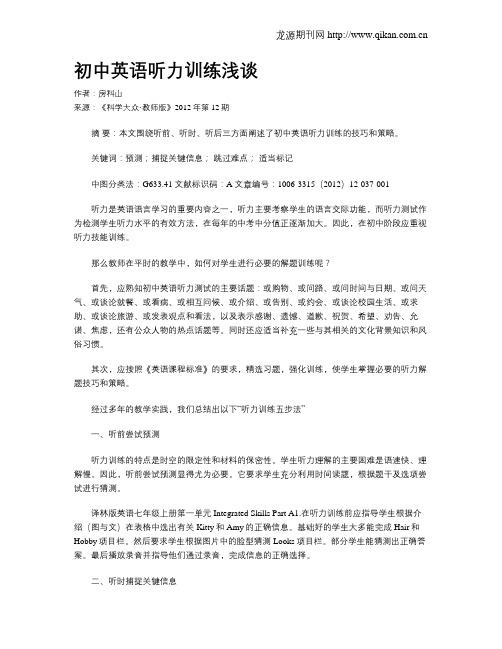
初中英语听力训练浅谈作者:房科山来源:《科学大众·教师版》2012年第12期摘要:本文围绕听前、听时、听后三方面阐述了初中英语听力训练的技巧和策略。
关键词:预测;捕捉关键信息;跳过难点;适当标记中图分类法:G633.41 文献标识码:A 文章编号:1006-3315(2012)12-037-001听力是英语语言学习的重要内容之一,听力主要考察学生的语言交际功能,而听力测试作为检测学生听力水平的有效方法,在每年的中考中分值正逐渐加大。
因此,在初中阶段应重视听力技能训练。
那么教师在平时的教学中,如何对学生进行必要的解题训练呢?首先,应熟知初中英语听力测试的主要话题:或购物、或问路、或问时间与日期、或问天气、或谈论就餐、或看病、或相互问候、或介绍、或告别、或约会、或谈论校园生活、或求助、或谈论旅游、或发表观点和看法,以及表示感谢、遗憾、道歉、祝贺、希望、劝告、允诺、焦虑,还有公众人物的热点话题等。
同时还应适当补充一些与其相关的文化背景知识和风俗习惯。
其次,应按照《英语课程标准》的要求,精选习题,强化训练,使学生掌握必要的听力解题技巧和策略。
经过多年的教学实践,我们总结出以下“听力训练五步法”一、听前尝试预测听力训练的特点是时空的限定性和材料的保密性。
学生听力理解的主要困难是语速快、理解慢。
因此,听前尝试预测显得尤为必要。
它要求学生充分利用时间读题,根据题干及选项尝试进行猜测。
译林版英语七年级上册第一单元Integrated Skills Part A1.在听力训练前应指导学生根据介绍(图与文)在表格中选出有关Kitty和Amy的正确信息。
基础好的学生大多能完成Hair和Hobby项目栏。
然后要求学生根据图片中的脸型猜测Looks项目栏。
部分学生能猜测出正确答案。
最后播放录音并指导他们通过录音,完成信息的正确选择。
二、听时捕捉关键信息捕捉关键信息是听力训练中最重要的一环,因为录音转瞬间消逝,难以再现。
训练英语听力的方法
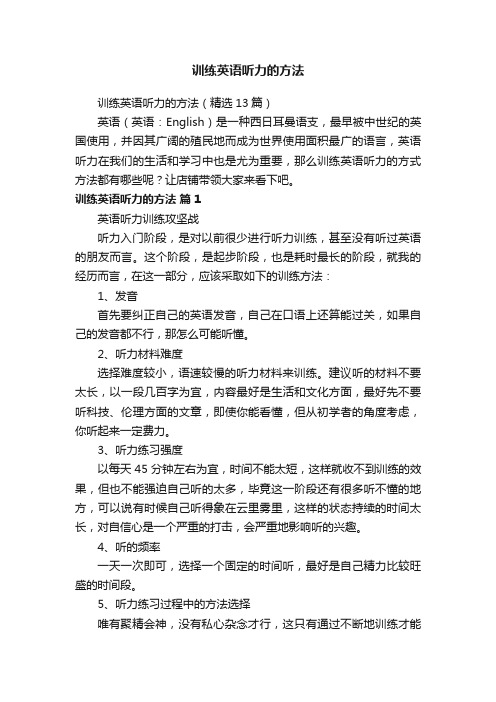
训练英语听力的方法训练英语听力的方法(精选13篇)英语(英语:English)是一种西日耳曼语支,最早被中世纪的英国使用,并因其广阔的殖民地而成为世界使用面积最广的语言,英语听力在我们的生活和学习中也是尤为重要,那么训练英语听力的方式方法都有哪些呢?让店铺带领大家来看下吧。
训练英语听力的方法篇1英语听力训练攻坚战听力入门阶段,是对以前很少进行听力训练,甚至没有听过英语的朋友而言。
这个阶段,是起步阶段,也是耗时最长的阶段,就我的经历而言,在这一部分,应该采取如下的训练方法:1、发音首先要纠正自己的英语发音,自己在口语上还算能过关,如果自己的发音都不行,那怎么可能听懂。
2、听力材料难度选择难度较小,语速较慢的听力材料来训练。
建议听的材料不要太长,以一段几百字为宜,内容最好是生活和文化方面,最好先不要听科技、伦理方面的文章,即使你能看懂,但从初学者的角度考虑,你听起来一定费力。
3、听力练习强度以每天45分钟左右为宜,时间不能太短,这样就收不到训练的效果,但也不能强迫自己听的太多,毕竟这一阶段还有很多听不懂的地方,可以说有时候自己听得象在云里雾里,这样的状态持续的时间太长,对自信心是一个严重的打击,会严重地影响听的兴趣。
4、听的频率一天一次即可,选择一个固定的时间听,最好是自己精力比较旺盛的时间段。
5、听力练习过程中的方法选择唯有聚精会神,没有私心杂念才行,这只有通过不断地训练才能达到。
要做到避免外界因素的干扰。
6、经典听力材料VOA 特别英语:主要是新闻、文化方面的内容,语速90词每分钟,最适合有一定词汇量的听力初学者进行听力锻炼。
我听的时候这个节目的时间段是晚上9点半到10点,我每晚的这个时间都给了SPECIAL ENGLISH,持续了3个月。
建议采取的听力方法:做听力笔记,手中有笔和纸,及时地记下一些不熟知的词汇,因为特别英语的常用词只有1600左右,把这些常用词都弄懂,完全听懂它只是一个时间问题。
英语创新一课一练七下人教版听力

英语创新一课一练七下人教版听力一、概述英语作为一门全球性语言,在现代社会中扮演着举足轻重的角色。
而在学习英语的过程中,听力是至关重要的一环。
对于学生来说,通过听力练习,可以提升自己的听力水平,增强对英语语音和语调的感知能力,同时也可以丰富自己的词汇和语法知识。
在教学中,针对学生的听力能力进行有效的训练显得尤为重要。
二、英语听力训练的重要性1. 提高语音感知能力听力训练可以使学生更加敏感地捕捉和理解英语中的各种语音,从而帮助他们更加正确地发音和模仿。
2. 加强对语调的理解通过听力练习,学生可以更好地理解英语中的语调变化,从而提高自己的语感和表达能力。
3. 丰富词汇和语法知识听力训练可以帮助学生更加自然地接触和学习英语中的词汇和语法结构,从而提高他们的语言表达能力。
4. 提升综合语言能力听力训练不仅可以帮助学生提高听力水平,还可以提升他们的口语、阅读和写作能力,使其在各方面更加全面地掌握英语语言。
三、英语听力训练的方式和方法1. 多听多练学生可以通过听英语短文、对话、新闻等来进行大量的听力练习,培养自己的听力敏感度和反应能力。
2. 多种题型听力练习题型有选择题、填空题、判断题等,教师可以根据学生的实际情况设计不同类型的题目,让学生全面地接触和训练。
3. 结合实际结合学生的日常生活和学习实际,设计涉及不同场景和话题的听力练习,让学生更容易理解和接受。
4. 听力技巧听力技巧包括抓住关键词、注意上下文连贯、提高对于语速和语音的适应能力等,教师可以引导学生掌握这些技巧,并在实践中加以运用。
四、英语创新一课一练七下人教版听力的特点英语创新一课一练七下人教版的听力部分,具有以下特点:1. 题材丰富听力素材涵盖了生活、学习、旅游、娱乐等多个方面的内容,让学生在练习中接触到更多的实际情景。
2. 题型多样听力题型包括选择题、填空题、判断题等多种形式,以及不同难度的题目,可以满足不同层次学生的需求。
3. 语速适中音频的语速适中,让学生在练习中既能听清楚内容,又能提高对语速的适应能力。
初中英语听力强化训练(18)英语听力
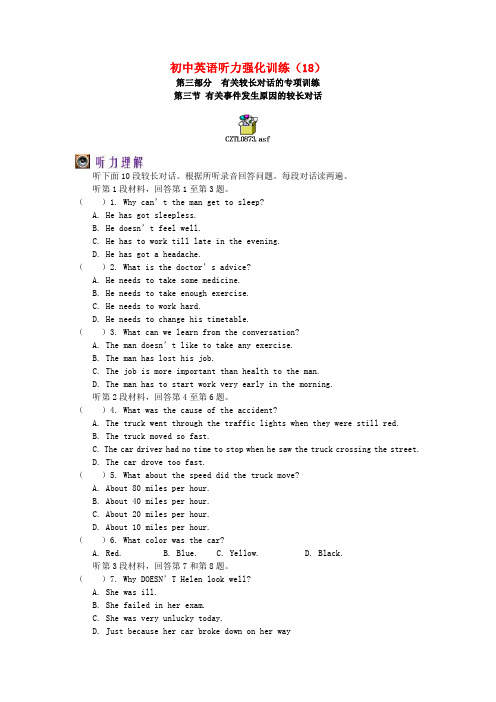
初中英语听力强化训练(18)第三部分有关较长对话的专项训练第三节有关事件发生原因的较长对话听下面10段较长对话。
根据所听录音回答问题。
每段对话读两遍。
听第1段材料,回答第1至第3题。
()1. Why can’t the man get to sleep?A. He has got sleepless.B. He doesn’t feel well.C. He has to work till late in the evening.D. He has got a headache.()2. What is the doctor’s advice?A. He needs to take some medicine.B. He needs to take enough exercise.C. He needs to work hard.D. He needs to change his timetable.()3. What can we learn from the conversation?A. The man doesn’t like to take any exercise.B. The man has lost his job.C. The job is more important than health to the man.D. The man has to start work very early in the morning.听第2段材料,回答第4至第6题。
()4. What was the cause of the accident?A. The truck went through the traffic lights when they were still red.B. The truck moved so fast.C. The car driver had no time to stop when he saw the truck crossing the street.D. The car drove too fast.()5. What about the speed did the truck move?A. About 80 miles per hour.B. About 40 miles per hour.C. About 20 miles per hour.D. About 10 miles per hour.()6. What color was the car?A. Red.B. Blue.C. Yellow.D. Black.听第3段材料,回答第7和第8题。
如何提高中学生的英语听力能力
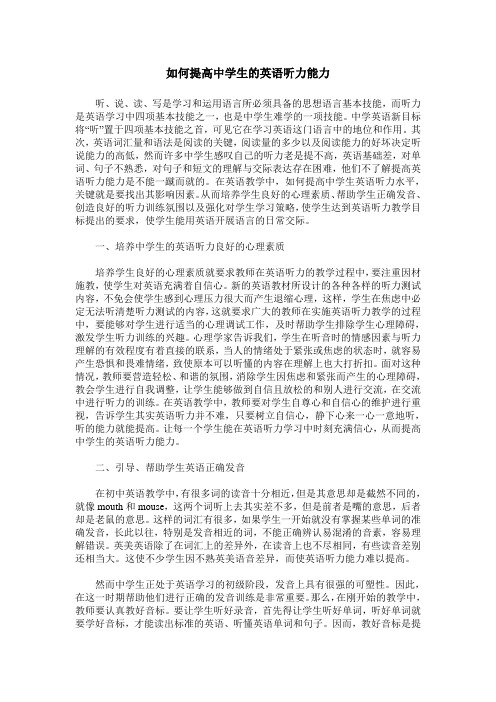
如何提高中学生的英语听力能力听、说、读、写是学习和运用语言所必须具备的思想语言基本技能,而听力是英语学习中四项基本技能之一,也是中学生难学的一项技能。
中学英语新目标将“听”置于四项基本技能之首,可见它在学习英语这门语言中的地位和作用。
其次,英语词汇量和语法是阅读的关键,阅读量的多少以及阅读能力的好坏决定听说能力的高低,然而许多中学生感叹自己的听力老是提不高,英语基础差,对单词、句子不熟悉,对句子和短文的理解与交际表达存在困难,他们不了解提高英语听力能力是不能一蹴而就的。
在英语教学中,如何提高中学生英语听力水平,关键就是要找出其影响因素。
从而培养学生良好的心理素质、帮助学生正确发音、创造良好的听力训练氛围以及强化对学生学习策略,使学生达到英语听力教学目标提出的要求,使学生能用英语开展语言的日常交际。
一、培养中学生的英语听力良好的心理素质培养学生良好的心理素质就要求教师在英语听力的教学过程中,要注重因材施教,使学生对英语充满着自信心。
新的英语教材所设计的各种各样的听力测试内容,不免会使学生感到心理压力很大而产生退缩心理,这样,学生在焦虑中必定无法听清楚听力测试的内容,这就要求广大的教师在实施英语听力教学的过程中,要能够对学生进行适当的心理调试工作,及时帮助学生排除学生心理障碍,激发学生听力训练的兴趣。
心理学家告诉我们,学生在听音时的情感因素与听力理解的有效程度有着直接的联系,当人的情绪处于紧张或焦虑的状态时,就容易产生恐惧和畏难情绪,致使原本可以听懂的内容在理解上也大打折扣。
面对这种情况,教师要营造轻松、和谐的氛围,消除学生因焦虑和紧张而产生的心理障碍,教会学生进行自我调整,让学生能够做到自信且放松的和别人进行交流,在交流中进行听力的训练。
在英语教学中,教师要对学生自尊心和自信心的维护进行重视,告诉学生其实英语听力并不难,只要树立自信心,静下心来一心一意地听,听的能力就能提高。
让每一个学生能在英语听力学习中时刻充满信心,从而提高中学生的英语听力能力。
七年级上册英语听力训练方法总结
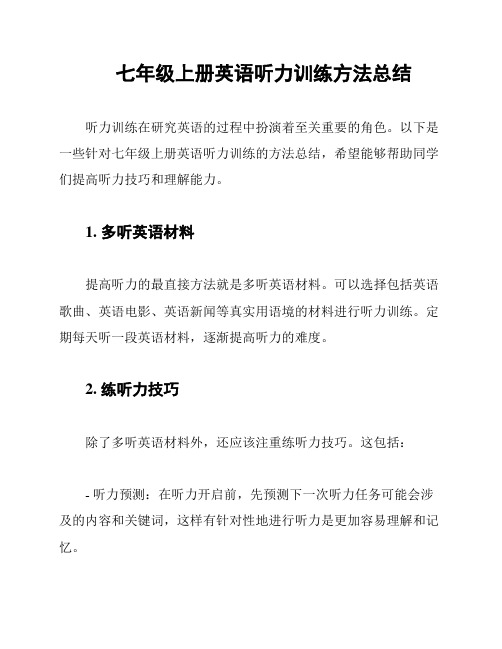
七年级上册英语听力训练方法总结听力训练在研究英语的过程中扮演着至关重要的角色。
以下是一些针对七年级上册英语听力训练的方法总结,希望能够帮助同学们提高听力技巧和理解能力。
1. 多听英语材料提高听力的最直接方法就是多听英语材料。
可以选择包括英语歌曲、英语电影、英语新闻等真实用语境的材料进行听力训练。
定期每天听一段英语材料,逐渐提高听力的难度。
2. 练听力技巧除了多听英语材料外,还应该注重练听力技巧。
这包括:- 听力预测:在听力开启前,先预测下一次听力任务可能会涉及的内容和关键词,这样有针对性地进行听力是更加容易理解和记忆。
- 注意听力中的关键信息:聚焦于听力中的关键词和关键信息,忽略累赘的内容,以提高听力的理解能力。
- 训练快速听取:试着逐渐加快听力速度,以提高对快速说话者的听力理解。
3. 模拟听力考试为了应对实际的听力考试,建议同学们进行模拟听力考试。
选择合适的模拟试卷,按照规定的时间和条件进行模拟考试,逐渐熟悉考试的形式和要求。
4. 跟读练跟读是提高听力和口语的有效方法。
选择一段英语材料,先听几遍,然后尝试模仿其中的语音、语调和语速进行跟读练。
这样可以帮助加深对英语语音和语调的理解,并提高口语流利度。
5. 结合阅读和听力研究英语听力时,可以结合阅读材料进行练。
先独立阅读一段材料,然后尝试通过听力来验证自己的理解是否正确。
这样可以提高听力和阅读的互动能力,并且强化对具体语境的理解。
6. 寻找合适的研究资源在网络上可以找到许多关于七年级英语的听力训练资源。
可以寻找一些合适的资源进行研究,如在线听力课程、听力练APP等。
这样能够提供多样化的练形式,增加研究的乐趣和效果。
以上是针对七年级上册英语听力训练的一些方法总结,希望同学们能够尽快掌握这些技巧并在听力训练中取得更好的成绩。
加油!。
- 1、下载文档前请自行甄别文档内容的完整性,平台不提供额外的编辑、内容补充、找答案等附加服务。
- 2、"仅部分预览"的文档,不可在线预览部分如存在完整性等问题,可反馈申请退款(可完整预览的文档不适用该条件!)。
- 3、如文档侵犯您的权益,请联系客服反馈,我们会尽快为您处理(人工客服工作时间:9:00-18:30)。
强化训练(二)满分:25分Ⅰ.请听单词,选择他们所属的类别。
朗读两遍。
(5分)A.colourB. foodC. clothesD. countryE. animal1. 2. 3. 4. 5. Ⅱ.请听句子,选择最佳的应答语。
朗读两遍(5分)A.It’s a sweater.B. I feel very hot.C. There it is.D. My elbow hurts.E. Sure. Here you are.6. 7. 8. 9. 10. Ⅲ. 请听对话及问题,选择相应的图片。
朗读两遍。
(5分)Ⅳ.请听短文,选择正确答案。
朗读两遍。
(10分)()16. What does Peter do?A. A doctor.B. A waiter.C. A reporter.()17. What does Peter look like?A.He is tall with blond hair.B.He is of medium build and has blond hair.C.He is of medium height and has brown hair.()18. What does Peter think of the Great Wall?A.He doesn’t mind it.B.He doesn’t like it.C.He loves it .()19. What kind of food does Peter like?A.Peking Duck.B. Noodles.C. Dumplings. ()20. What does Peter think of lions?A.Big and lazy.B.Big and dirty.C.Dirty and lazy.强化训练(三)满分:25分Ⅰ.听句子,选出与其意思相符的图片。
朗读两遍。
(5分)Ⅱ.听对话,选择正确答案。
朗读两遍(5分)()6. Where does Tom live?A.In London.B. In Paris.C. In Moscow. ()7. How was the weather on Sunday?A.Cloudy.B. Windy.C. Sunny ()8. What did John look like last year?A.He had short straight hair.B.He had long curly hair.C.He had long blond hair.()9. What are they talking about?A.The school rules.B. The family rules.C. Studying.()10. What does Jane think of her vacation?A.She loves it.B. She doesn’t mind it.C. She can’t stand it. Ⅲ.听长对话,选择正确答案。
朗读两遍。
(5分)()11. Mary go to the zoo now.A.canB. can’tC. doesn’t want to()12. How’s the weather?A.Sunny and cool.B.Rainy and cold.C.Sunny and cold.()13. Mary has to on weekends.A.do her homeworkB.practise her violinC.practise her guitar()14. Kinds of animals are mentioned in the dialogue(对话).A.TwoB. ThreeC. Four()15. What does Danny think of Mary’s family rules?A.He can’t stand them.B.He doesn’t mind them.C.He loves them.Ⅳ.听短文,完成表格(每空词数不限)。
朗读两遍。
(共10分)强化训练(四)满分:25分Ⅰ.听句子,选出与其意思相符的图片(其中有两幅是多余的)。
朗读两遍。
(5分)1. 2. 3. 4. 5.Ⅱ.听对话,选择正确答案。
朗读两遍。
(5分)()6. The girl wants to be .A.an actorB. a singerC. a ping-pong player()7. Jenny has now.A.curly hairB. long straight hairC. short straight hair ()8. Where are they?A.In a restaurant.B. In a clothes store.C. At school.()9. Where didn’t the girl go last weekend?A.She didn’t go to a new zoo.B.She didn’t go to a new park.C.She didn’t go to the mountains.()10. The girl thinks Animal World is .A.boringB. excitingC. interestingⅢ.听长对话,选择正确答案。
朗读两遍。
(5分)()11. The post office is Red Star Middle School.A.in front ofB. next toC. across from()12. Alice is from .A.JapanB. ChinaC. the United Kingdom()13. Alice came to the school .st yearB. last monthC. last week()14. They can’t listen to music .A.in the dining hallB. in the classroomC. in the hallways ()15. What does Jack think of the school rules?A.He doesn’t mind them.B.He can’t stand them.C.He doesn’t like them.Ⅳ.听短文,选择正确答案。
朗读两遍。
(10分)()16. Meimei lives in .A.ChinaB. CanadaC. the USA()17. Meimei goes to school .A.by busB. on footC. on a bicycle()18. Mr Zhao is a(n) teacher.A.mathB. ChineseC. English()19. Meimei and her friends like to .A.watch TVB. watch moviesC. listen to the radio()20. is coming.A.National DayB. Children’s Day D. Spring Festival强化训练(五)满分:25分Ⅰ.请听句子,选出与其中内容相符的图片。
朗读两遍。
(5分)Ⅱ.请听对话及问题,选择正确答案。
朗读两遍。
(5分)()6. A. Thirteen. B. Fourteen. C. Twelve.()7. A. Yes, she can. B. We don’t know. C. No, she can’t.()8. A. Yes, there is. B. No, there isn’t. C. No, there is a dictionary. ()9. A. Any pears. B. Any eggs and melons. C. Any oranges.()10. A. Some water. B. Some apple juice. C. Some milk.Ⅲ.请听长对话,根据其内容补全下列句子(每空一词)。
朗读两遍。
(5分)11. The girl has breakfast at .12. The boy has some bread, and a glass of milk for breakfast.13. The girl has a , an apple and a glass of milk for breakfast.14. The girl has two eggs, some and fruit for supper.15. The boy has some pork, potatoes and for supper.Ⅳ.请听短文,判断下列句子正(T)误(F)。
朗读两遍。
(10分)()16. This is a big old school.()17. There are twenty classrooms in the school.()18. The library is behind the offices.()19. There are five science labs in the school.()20. A dining hall is behind the playground.强化训练(六)满分:5分Ⅰ.请听句子,选出与其内容相符的图片。
朗读两遍。
(5分)Ⅱ.请听对话及内容,选择正确答案。
朗读两遍。
(5分)()6. A. On Miss Li’s desk. B. On Mrs Li’s desk. C. On Mr Li’s desk.()7. A. He does his homework. B. He plays computer games. C. She plays computer games. ()8. A. Milk and carrots. B. Meat and carrots. C. Milk and meat.()9. A. A sister. B. A brother and a sister. C. A brother.()10. A. Watch TV. B. Do housework. C. Watch TV and do housework.Ⅲ.请听长对话,根据其内容补全下列句子(每空一词)。
朗读两遍。
(5分)11. This is a picture of family.12. There are people in the picture.13. Betty’s live in London.14. Mary is a and she works in a factory.15. Betty’s is a manager.Ⅳ.请听短文,选择正确答案。
